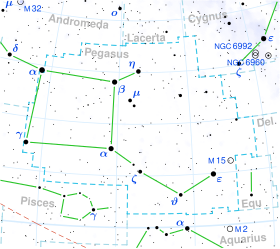室宿二
室宿二(β Pegasi,缩写Beta Peg、β Peg),正式命名为Scheat /ˈʃiːæt/[12][13],是一颗红巨星,并且是星座飞马座的第二亮星(最亮星是飞马座ε)。 它位于飞马座四边形的右上角[14],组成一个长方形的星群。
| 观测资料 历元 J2000 | |
|---|---|
| 星座 | 飞马座 |
| 星官 | |
| 赤经 | 23h 03m 46.45746s[1] |
| 赤纬 | +28° 04′ 58.0336″[1] |
| 视星等(V) | 2.42[2] (2.31 – 2.74)[3] |
| 特性 | |
| 光谱分类 | M2.5II–IIIe[4] |
| U−B 色指数 | +1.96[2] |
| B−V 色指数 | +1.67[2] |
| 变星类型 | 半规则[5] |
| 天体测定 | |
| 径向速度 (Rv) | +8.7[6] km/s |
| 自行 (μ) | 赤经:+187.65[1] mas/yr 赤纬:+136.93[1] mas/yr |
| 视差 (π) | 16.64 ± 0.15[1] mas |
| 距离 | 196 ± 2 ly (60.1 ± 0.5 pc) |
| 绝对星等 (MV) | −1.41[7] |
| 详细资料 | |
| 质量 | 1.7±0.3[8] M☉ |
| 半径 | 109±7[9] R☉ |
| 表面重力 (log g) | 1.20[10] |
| 亮度 | 1,644[8][a] L☉ |
| 温度 | 3,606[8] K |
| 金属量 [Fe/H] | −0.11[10] dex |
| 自转速度 (v sin i) | 9.7[11] km/s |
| 其他命名 | |
| 参考资料库 | |
| SIMBAD | 资料 |
命名原则
编辑这颗恒星在拜耳命名法中被命名为“飞马座β”(拉丁化到“β Pekasi”)。
它有一个传统的名字“Scate”,这个名字也曾用于羽林军二十六(宝瓶座δ),因此会造成混淆。这个名字来源于阿拉伯语“Al Sā'id”或“Sa'd”,意思是“上臂”[14]。在2016年,国际天文学联合会组织了 恒星名称工作组(WGSN,Working Group on Star Names)[15]对恒星的专有名称进行编目和标准化。WGSN在2016年7月 的第一份报告[16]包括WGSN准予的前两批名称表;其中包括这颗恒星的名称为“Scate”(“Skat”则是宝瓶座δ的名字[13])。
距离和特性
编辑根据视差量测,室宿二距离太阳196光年(60秒差距)[1],与太阳这样的恒星相比,如此明亮恒星的表面温度相对较低,这是不寻常的。 这颗恒星的恒星分类为M2.3 II–III[4],这表明其光谱具有介于亮巨星和巨星之间的特征。它已经膨胀到原来的109倍[9],其总光度是太阳的1640倍[8]。这颗恒星外壳的有效温度大约是 3,600K[8],赋予该恒星有著M型恒星特有的橙红色色调[20]。光球足够冷,可以形成氧化钛分子[21]。
室宿二是一颗周期43.4天的半规则变星[5],亮度变化的范围在星等 +2.31至 +2.74(平均2.42等)[3]。它的质量损失速度等于或低于每年10−8太阳的质量,因此正在形成一个膨胀的气体和尘埃外壳,半径约为太阳半径的3,500倍(16天文单位)[22]。
注解
编辑- ^ 根据方程式中的辐射热测量值100.4(4.74-Mbol)计算,此处的"Mbol" 是辐射热测量值。
参考资料
编辑- ^ 1.0 1.1 1.2 1.3 1.4 1.5 van Leeuwen, F., Validation of the new Hipparcos reduction, Astronomy and Astrophysics, November 2007, 474 (2): 653–664, Bibcode:2007A&A...474..653V, S2CID 18759600, arXiv:0708.1752 , doi:10.1051/0004-6361:20078357
- ^ 2.0 2.1 2.2 Johnson, H. L.; et al. UBVRIJKL photometry of the bright stars. Communications of the Lunar and Planetary Laboratory. 1966, 4 (99): 99. Bibcode:1966CoLPL...4...99J.
- ^ 3.0 3.1 Query= bet Peg, General Catalogue of Variable Stars (Centre de Données astronomiques de Strasbourg), [2010-01-05]
- ^ 4.0 4.1 4.2 V* bet Peg -- Pulsating variable Star, SIMBAD (Centre de Données astronomiques de Strasbourg), [2010-01-05]
- ^ 5.0 5.1 Tabur, V.; et al, Long-term photometry and periods for 261 nearby pulsating M giants, Monthly Notices of the Royal Astronomical Society, December 2009, 400 (4): 1945–1961, Bibcode:2009MNRAS.400.1945T, S2CID 15358380, arXiv:0908.3228 , doi:10.1111/j.1365-2966.2009.15588.x
- ^ Wilson, Ralph Elmer, General Catalogue of Stellar Radial Velocities, Washington (Washington: Carnegie Institution of Washington), 1953, Bibcode:1953GCRV..C......0W
- ^ Huang, W.; et al, A catalogue of Paschen-line profiles in standard stars, Astronomy & Astrophysics, 2012, 547: A62, Bibcode:2012A&A...547A..62H, S2CID 119286159, arXiv:1210.7893 , doi:10.1051/0004-6361/201219804.
- ^ 8.0 8.1 8.2 8.3 8.4 Halabi, Ghina M.; Eid, Mounib El. Exploring masses and CNO surface abundances of red giant stars. Monthly Notices of the Royal Astronomical Society. 2015-08-01, 451 (3): 2957–2967. Bibcode:2015MNRAS.451.2957H. ISSN 0035-8711. arXiv:1507.01517 . doi:10.1093/mnras/stv1141 .
- ^ 9.0 9.1 Arroyo-Torres, B.; et al. VLTI/AMBER observations of cold giant stars: atmospheric structures and fundamental parameters. Astronomy & Astrophysics. June 2014, 566: 11. Bibcode:2014A&A...566A..88A. S2CID 16778588. arXiv:1404.7384 . doi:10.1051/0004-6361/201323264. A88.
- ^ 10.0 10.1 Soubiran, C.; et al, Vertical distribution of Galactic disk stars. IV. AMR and AVR from clump giants, Astronomy and Astrophysics, 2008, 480 (1): 91–101, Bibcode:2008A&A...480...91S, S2CID 16602121, arXiv:0712.1370 , doi:10.1051/0004-6361:20078788
- ^ Massarotti, Alessandro; et al, Rotational and Radial Velocities for a Sample of 761 HIPPARCOS Giants and the Role of Binarity, The Astronomical Journal, January 2008, 135 (1): 209–231, Bibcode:2008AJ....135..209M, S2CID 121883397, doi:10.1088/0004-6256/135/1/209
- ^ Kunitzsch, Paul; Smart, Tim. A Dictionary of Modern star Names: A Short Guide to 254 Star Names and Their Derivations 2nd rev. Cambridge, Massachusetts: Sky Pub. 2006. ISBN 978-1-931559-44-7.
- ^ 13.0 13.1 IAU Catalog of Star Names. [28 July 2016].
- ^ 14.0 14.1 Allen, Richard Hinckley, Star Names: Their Lore and Meaning, New York, NY: Dover Publications Inc.: 325, 1899, ISBN 0-486-21079-0
- ^ IAU Working Group on Star Names (WGSN). [22 May 2016].
- ^ Bulletin of the IAU Working Group on Star Names, No. 1 (PDF). [28 July 2016].
- ^ (中文) 中国星座神话, written by 陈久金. Published by 台湾书房出版有限公司, 2005, ISBN 978-986-7332-25-7.
- ^ (中文) 香港太空馆 - 研究资源 - 亮星中英对照表 互联网档案馆的存档,存档日期2008-10-25., Hong Kong Space Museum. Accessed on line November 23, 2010.
- ^ Light Curve, Hipparcos ESA, ESA, [21 September 2022].
- ^ The Colour of Stars, Australia Telescope, Outreach and Education (Commonwealth Scientific and Industrial Research Organisation), December 21, 2004 [2012-01-16], (原始内容存档于2012-03-18)
- ^ Gavin, M., Stellar spectroscopy with CCDs - some preliminary results, Journal of the British Astronomical Association, February 1996, 106 (1): 11–15, Bibcode:1996JBAA..106...11G
- ^ Mauron, N.; Caux, E., K I/Na I scattering observations in circumstellar envelopes - Alpha(1) Herculis, Omicron Ceti, TX PISCIUM and Beta Pegasi, Astronomy and Astrophysics, November 1992, 265 (2): 711–725, Bibcode:1992A&A...265..711M. Solar Radius = 0.0046491 AU.
